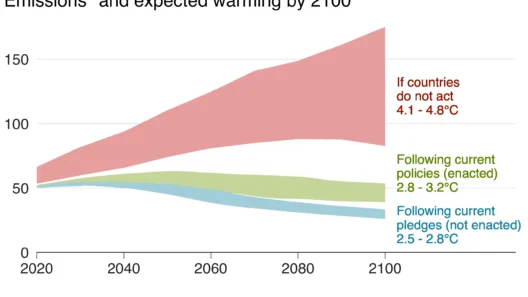In the realm of global warming, a perplexing question arises: Are civilians truly powerless against the vast machinery of climate change, or could they be the unsung heroes in monitoring and combatting this pressing issue? This inquiry becomes particularly significant as the effects of climate change grow increasingly pronounced. As individuals bear witness to erratic weather patterns, rising sea levels, and increasing temperatures, the notion of civic engagement in the climate narrative begs deeper examination.
To address this question effectively, it is crucial to understand the myriad dimensions of civilian involvement in environmental vigilance. Historically, individuals have often felt marginalized in the face of robust governmental and industrial structures. Yet, with the advent of technology and heightened environmental awareness, a paradigm shift is occurring. Civilians are not merely passive observers; they possess the potential to be proactive agents of change.
The power of civilian monitoring can be observed through grassroots movements advocating for sustainability and environmental justice. These groups coalesce diverse individuals, driven by a collective desire to challenge the status quo and demand accountability. For instance, organizations such as Greenpeace and the Sierra Club mobilize citizens to engage in activism, often using social media to amplify their voices. This modern connectivity enables civilians to document environmental violations, lobby for policy changes, and foster community awareness regarding climate issues.
However, the question endures: are these movements effective? Indeed, they have catalyzed significant achievements. Noteworthy legislative reforms have emerged as a result of sustained grassroots advocacy. Consider the role of citizens in shaping local policies that aim to reduce carbon footprints or the implementation of renewable energy solutions. Through persistent engagement, communities can influence governmental priorities that align with climate resilience.
Nevertheless, a playful challenge remains: while civilians wield considerable power in advocating for change, can they ensure that their efforts translate into comprehensive monitoring of global warming? To navigate this query, it is imperative to explore how civilians can impact the scientific community and public understanding of climate change.
Recent advances in citizen science illustrate a burgeoning trend where ordinary people contribute to environmental research. Platforms like iNaturalist allow individuals to document biodiversity in their locales, providing invaluable data to scientists tracking shifting ecosystems. Such contributions illuminate potential effects of climate change on species distribution and habitat loss. Moreover, these collaborative efforts not only bolster scientific understanding but also foster a sense of stewardship among participants, embedding environmental consciousness into daily life.
However, a critical examination reveals an inherent limitation: reliance on volunteer data can often lead to inconsistencies. Questions arise over the accuracy and reliability of information gathered by untrained individuals. Therefore, while civilians can enhance scientific endeavors, a systematic framework must be established to vet and validate citizen-collected data. Engaging with experts and academic institutions can ameliorate these concerns, creating symbiotic relationships that empower both civilians and scientists alike.
Furthermore, this dual engagement triggers another crucial factor in understanding the challenge: education. The breadth and depth of knowledge surrounding climate change is vital for effective civilian participation. Informed citizens are more adept at identifying environmental changes, advocating for sustainable practices, and holding sectors accountable. Thus, educational initiatives, particularly in underserved communities, play a pivotal role. Encouraging critical thinking about climate science can inspire the next generation of environmental monitors, fostering a culture of inquiry and responsibility.
In addition to education, technology serves as an indispensable ally in the quest for effective civilian monitoring. Mobile applications and satellite imagery now facilitate real-time data collection and analysis, empowering individuals to track environmental changes in their surroundings. For instance, platforms that record air quality or water pollution levels enable civilians to report anomalies, effectively creating a system of checks and balances against industries that may otherwise evade scrutiny.
Yet, as these tools proliferate, a corresponding challenge arises: digital equity. Not all individuals possess equal access to technology, raising concerns over disparities in community engagement and data representation. Bridging this gap must become a priority; ensuring that marginalized populations can also participate in climate monitoring is crucial for holistic representation and action.
Ultimately, while the notion of civilian power in monitoring global warming may initially appear tenuous, it is increasingly evidenced by dynamic interactions within society. Civilians hold the potential not only to advocate for change but also to serve as frontline observers of environmental degradation. By embracing collaborative science, educating communities, and leveraging technology, citizens can forge a pathway towards a more equitable and sustainable future.
In conclusion, the interplay between civilians and environmental monitoring reveals a complex matrix of power dynamics. While obstacles undoubtedly exist, the very act of engaging in this dialogue fosters hope. Civilians are not powerless bystanders; they represent a formidable force that, when mobilized effectively, can profoundly shape the trajectory of climate policy and environmental stewardship. As the world continues to grapple with the realities of global warming, the question shifts from a trivial inquiry into a clarion call for civic responsibility, collaboration, and continuous engagement in the fight against climate change.








